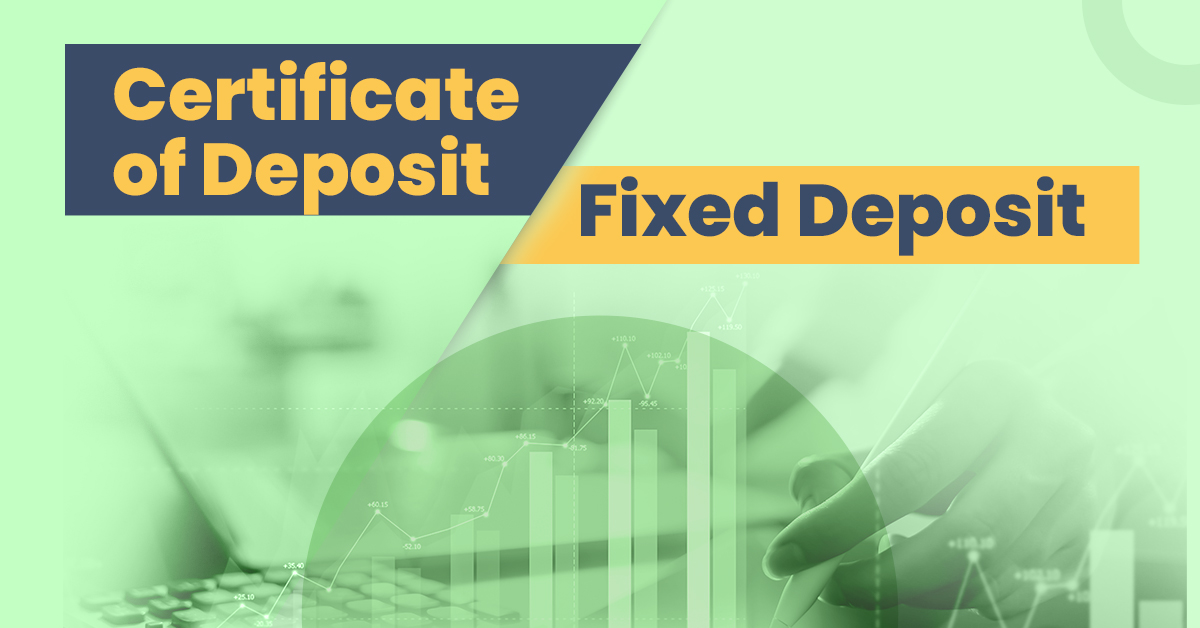Certificate of Deposit vs Fixed Deposit: Key Differentiating Factors


In this article, readers will gain insights into the difference between Certificate of Deposit (CD) and Fixed Deposit (FD), two prevalent forms of term deposit. While both are popular investment avenues, they cater to different needs and financial goals.
Here, we will explore the distinctive features, benefits, and suitability of CDs and bank fixed deposits, helping you decide where to park your funds. Whether you’re a seasoned investor or a beginner, understanding the nuances of these term deposits is crucial for optimizing your investment strategy.
What is a Fixed Deposit?
Fixed Deposit (FD) is an investment scheme in which you can invest a lump sum amount for a specific tenure for a fixed interest rate. Banks, Non-Banking Financial Companies (NBFCs), and post offices offer FD schemes. The interest rate remains unchanged throughout the tenure, giving you assured returns. The interest rate depends upon the investment amount and tenure, varying from bank to bank.
Moreover, senior citizens are offered higher interest rates on their investments in an FD scheme. Also, FDs placed with a bank are insured by DICGC up to INR 5,00,000. Unlike mutual funds, investments in an FD scheme fall under the almost-zero risk category as they offer assured returns with negligible risk up to INR 5 lacs per bank.
You can open multiple FD accounts in banks and NBFCs. You also have the flexibility of closing an FD account if you need funds in case of a financial emergency. Many FD schemes allow you to withdraw your investment before the maturity date; however, you will have to pay a penalty.
Some FD schemes (with a tenure of five years) also offer tax deductions on investments up to Rs. 1,50,000 as per Section 80C of the Income Tax Act, 1961. Furthermore, you can avail loans by keeping your FD as collateral and enjoy a lower interest rate.
Also Read: Experience financial growth with unmatched Bajaj Finance FD Rates
Here are some of the key features of a Fixed Deposit:
- Steady Returns: FDs offer fixed, steady returns, making them a reliable investment choice.
- Flexible Tenure: Investors can choose the investment period, which typically ranges from 7 days to 10 years, according to their financial goals.
- Safety and Security: FDs are known for being a safe and secure form of investment, especially when held with established banks.
- Loan Facility: Many banks offer the option to avail a loan against FDs, providing liquidity when needed.
What is a Certificate of Deposit?
A certificate of Deposit (CD) is a short-term fixed-income investment option. In many cases, CDs are similar to FDs. You invest a lump sum amount for a specific tenure in an authorised bank or financial institution and receive an assured interest amount along with the invested amount upon maturity. However, a CD scheme has its own features and benefits.
CDs are issued in a dematerialised form and they are held with a depository registered with Securities and Exchange Board of India (SEBI). CDs are regulated by the Reserve Bank of India (RBI).
Scheduled commercial banks, small finance banks, regional rural banks, and all India Financial Institutions like SIDBI, Exim Bank, NABARD and NHB can issue CDs. All Indian residents can invest in a CD scheme. The minimum amount of investment in a CD scheme is Rs. 5,00,000, and you can invest only in multiples of Rs. 5,00,000 thereafter.
Investment tenure for CDs generally varies from seven days to one year. CDs with a maturity of 1-3 years can be issued by All-India Financial Institutions.
Here are some of the key features of a Certificate of Deposit:
- Higher Interest Rates: CDs usually offer higher interest rates than regular savings accounts, compensating for the lack of liquidity.
- Fixed Maturity Date: They have a specified maturity date, ranging from a few months to several years, providing a clear investment timeline.
- Safety: Being a bank product, CDs are relatively low-risk, especially if issued by reputable institutions.
- Penalty for Early Withdrawal: Investors might face a penalty for withdrawing funds before the maturity date, ensuring the investment stays intact.
Key Differences Between Fixed Deposit and Certificate of Deposit
Below are the some crucial differences in the features of fixed deposit and certificate of deposit:
| Parameter | Fixed Deposit | Certificate of Deposit |
| Minimum amount of investment | Generally, Rs. 1,000. However, it depends on individual banks, NBFCs, and post offices | Rs. 5,00,000 and in multiples of 5,00,000 thereafter |
| Tenure of investment | Seven days to 10 years | Seven days to one year (for commercial banks) and seven days to three years for financial institutions. |
| Interest rate | Each bank and NBFC sets its interest rate depending on the investment amount and tenure. Rates remains fixed throughout the tenure | Fixed or floating interest rate, and generally higher than bank FDs |
| Discount on face value | Not allowed | Allowed |
| Collateral against loans | Can be used | Can not be used |
| Higher interest rate for senior citizens | Provided | Interest rates are the same for all investors |
| Tax benefits | Some FD schemes offer tax exemptions | No tax exemptions under any conditions |
- Certificate of deposits comes with the benefit of returning your investment with earned interest within a short period, which makes this an efficient and effective option for those who want to invest for a short period.
- Fixed deposits guarantee a fixed interest rate throughout the whole period of investment, irrespective of market fluctuations. This is the safest way to invest, providing the exact returns predictions when you invest.
Certificate of Deposit vs Fixed Deposit: Which Scheme to Invest in?
The investment amount and tenure are crucial factors when choosing between an FD and CD. So, you need to consider your financial goals and the amount in hand before investing. If you have a lump sum amount sitting idle in your savings account and have a financial goal to achieve five years down the line, you can choose FD.
However, if you have a short-term financial goal and have enough funds on your hands, you can select a CD. Moreover, you should consider the terms of early withdrawal of your investment in a CD scheme in case you need funds in emergencies. The terms of early withdrawal may vary from one financial institution to another.
Final Thoughts
Choosing between a fixed deposit and a certificate of deposit is easier when you consider the features of each scheme and the investment you are willing to make. The FD vs CD comparison shows crucial differences in aspects such as the investment tenure and the minimum investment amount.
Choose the most suitable scheme for fixed returns based on your financial goals, investment amount, and features such as the interest rate, loan facility, and premature withdrawal rules. It would be wise to invest in either of these schemes instead of keeping a lump sum amount in a savings bank account.
FAQs related to CD & FDs
What is the minimum investment amount for FD and CD schemes?
The minimum investment amount for an FD scheme is generally Rs. 1,000. However, it depends upon banks, NBFCs, and post offices. On the other hand, the minimum investment amount for a CD scheme is Rs. 5,00,000.
Does a CD scheme offer tax benefits on investments?
No, a CD scheme does not offer any tax benefits on investments under any conditions.
Which scheme should I choose between FD and CD if I want to invest for the long term?
You should choose an FD scheme if you are looking to invest for the long term. The maximum investment tenure for an FD scheme is up to 10 years. You can also avail tax deductions in some FD investments.
Can I use my certificate of deposit as collateral for a loan?
The Reserve Bank of India (RBI) does not allow the use of CDs as collateral against loans. However, you can utilise your FD receipt as collateral for availing of loans.
What does CD in dematerialised form mean?
CDs are issued in a dematerialised form only. This implies that there will be only online records of your investment in a CD scheme. The details of your investment in a CD scheme are recorded in a depository approved by the Securities and Exchange Board of India (SEBI). You will not get a physical certificate of your investment in a CD, unlike an FD.
Who should invest in a CD scheme?
You should invest in a CD scheme if you have a large amount sitting idle in a savings bank account and want to invest for the short term with low risks. The minimum investment amount for a CD is Rs. 5,00,000, and the maximum investment tenure can be up to three years. So, if you have short-term financial goals with a huge investment capacity and low risk appetite, you can invest in a CD scheme.
What is the difference between a certificate of deposit and a term deposit?
A certificate of deposit is a type of term deposit that has a fixed term and typically offers a higher interest rate, while a term deposit is a general term for deposits that are held for a fixed period, including certificates of deposit.
What is the difference between negotiable certificate of deposit and term deposit?
A negotiable certificate of deposit is a type of certificate of deposit that can be traded in the secondary market, making it more liquid, while a term deposit is usually non-negotiable and held until maturity.
What are the disadvantages of certificate of deposit?
The disadvantages of a certificate of deposit include penalties for early withdrawal, lower liquidity compared to savings accounts, and the potential for lower returns compared to other investment options.




